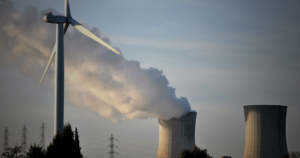Blair McDougall | Twitter
In November the world will gather in Glasgow for a summit on climate change that is being touted as the world’s last chance to stop runaway climate change. As Glaswegians, we will feel pride as the focus of the world lands on our city. As Scots, we will congratulate ourselves that, once again, we are contributing to the development of all humankind. The reality is that the hosts of the summit will be hypocrites.
The summit will take place in a nation where the political class are committed to supporting irreversible climate change. Why? Because the government and main opposition parties support squeezing out as much of the fossil fuels from beneath the North Sea and we can.
Before November Scotland must come together for a moment of honesty: it is simply not possible to support this policy, known as Maximum Economic Recovery (MER), and oppose climate change.
The Paris Agreement, secured at a previous summit, aims to limit global warming to no more than 2 degrees Celsius, and preferably to aim for a no more than 1.5 degrees Celsius increase. Scientists tell us that the potential carbon emissions from burning the oil, gas, and coal in the fields and mines where extraction is already underway are more than enough to exceed the 2 °C limit. Even after removing coal from the equation, burning the oil and gas from these sources already under production is enough to exceed the 1.5 °C threshold.
In short: if we want to avoid catastrophic climate change, we have a responsibility to stop production in oil fields already being exploited, sooner rather than later.
This responsibility to leave our fossil fuels in the ground should fall more heavily on Scotland and the UK than other nations. It simply is not fair to expect the burden of halting extraction to fall equally on developing and developed countries. Firstly, as nations that have been industrialised longest, and so have been heavy carbon polluters for far longer, we are more to blame for the problem. With less than a fifth of the world’s population, industrialised countries are responsible for nearly two-thirds of historic carbon pollution. Secondly, it would be entirely unjust to make it more difficult for the nations that only now are developing the energy access we reached generations ago. Giving them more space to develop their energy infrastructure is essential to our efforts to tackle global poverty.
The leadership of our political parties understand this, yet we will host the summit weighed down with a huge contradiction. Other leaders have acted on the science, like Jacinda Ardern who has banned new fossil fuel exploration or the Danish social democrats who have done the same and set a date for the end of extraction. Meanwhile, we have enshrined in legislation both maximising fossil fuel extraction and minimising carbon emissions.
Changes to the politics and economics of Scotland present an opportunity for a new consensus to be created ahead of Glasgow. North Sea Oil has been central to our national debate for my entire life, but its political power is waning.
In 2014 the Scottish Government’s independence plans assumed oil revenues of around £8 billion a year that would pay for social change. Four years later the SNP’s Growth Commission contained familiar rhetoric on oil revenues but their fiscal plans, which assumed no oil revenues, reflected the reality of the near-zero tax-take from the industry. On the pro-Union side of the divide, we touted the financial firepower that backs the exploitation of ageing, uneconomic fields. Going forward does either camp really want to build their prospectus for the future on supporting environmental disaster? To do so would be both irresponsible and immoral.
While there has been a big shift in the political context, there are still risks from taking a more honest position on climate change and fossil fuels. For socialists, the scars from communities abandoned by the loss of extractive industries is as deep in our emotional make-up as the sentiment behind ‘It’s Scotland’s Oil’ is for nationalists.
There’s good reason to fear that oil field communities will face a similar fate to the coalfield, steelworks or textile mill, communities, where well-paid jobs were replaced by any job you could get. Trade Unions representing both oil workers and renewable engineers are angry that of the 28,000 green jobs were promised by the SNP a decade ago, only 1,700 have materialised. They are left protesting as the Scottish Government loses green jobs at sites like Bifab or sources green manufacturing from overseas. Not so much the promised Saudi Arabia of renewables, more a jobs desert.
The last decade hasn’t been entirely lost, there are many examples of companies diversifying into green industries, but as a nation, we haven’t grasped the opportunity to have a first-mover advantage. We can still be an early-mover. Aberdeen is uniquely well-placed for wind, wave developments but for these industries to develop it needs to be backed by meaningful government targets and strategic investment.
The question isn’t whether the oil and gas industry will wind down. It isn’t really even a question of when it will begin. Tens of thousands of jobs were lost after the oil price crashed in 2014. Unions believe another 14 thousand oil and gas jobs have been lost during the pandemic. This isn’t just volatility; the decline is already happening. The question is when does widespread extraction end? Do we move into new greener industries sooner or later? It will be better if our engineering sector takes up opportunities at the start of this transition rather than fighting for scraps at the tail-end. Green energy is the global growth industry. It is better to be a seed of new growth than the last leaf on a dying tree.
Before the Holyrood elections, the three main political parties should give each other the political cover they need. They should stand together and declare that Maximum Economic Recovery should be dropped. They should put forward an amendment to the Infrastructure Act removing its legal basis and replacing it with a legal duty to immediately begin to transition out of fossil fuels in line with our net-zero commitments. Like Denmark they should set a date for the end of extraction. For the world, it would be a powerful display of leadership ahead of Glasgow. For Scotland, it would be a much-needed moment of consensus in a bitterly divided age, a chance to give fresh life to our moribund politics.
Ending MER would be throwing our hats over the wall. Thus far, targets on climate change stretch so far into the future that they are forgotten and replaced before anyone notices they were missed. No politician ever resigned over missing a target set ten years and ten ministers ago. Starting a countdown clock on the end of fossil fuels extraction would create the urgency, political competition and accountability that has been lacking.
The counterargument, driven by well-founded fears, is that we cannot commit to ending fossil fuel extraction until we have a plan to create replacement jobs or replacing the role oil and gas play in our energy supplies. But the truth is we will never seriously commit to creating those green jobs or investing in new energy infrastructure until we commit to ending extraction. Governments will go on creating processes and making vague commitments. A promise without a hard deadline is a lie. The plan for transition should absolutely be built through consensus with workers and communities, especially around Aberdeen. That is about agreeing details, Governments still have to set the destination and how long we have to get there. Leaders have to lead, not just convene.
Ditching MER will incentivise governments to give the birth of new industries the same sort of blank cheque that has been given at the death of an old one. Decommissioning, for example, will cost the taxpayers something upwards of £24 billion – those are the sort of numbers that should be attached to green industry announcements, not the single-digit millions that are put out in press releases to make it look like our governments are doing something. Think of the €40 billion of funds earmarked by the German Coal Commission to compensate for and adapt to the decision to end that industry as soon as 2035.
As well as making significant investments, the UK and Scottish Governments will have to put aside other arguments to work together. For example, there is no good in the UK government investing billions in new industry in the North East of Scotland if the Scottish Government isn’t also investing big in skills so that the workers in the area transition can actually into these jobs.
Congratulating ourselves for failure has become Scotland’s national disease. We prefer to tell ourselves a reassuring story about how special we are rather than confronting uncomfortable truths. This is an opportunity to break from that, a chance to talk big and act big.
Sooner or later though, we’re going to have to stop extracting fossil fuels. For the good of our environment, it needs to be sooner. Sooner or later, we’re going to have to start spending serious money on creating well-paid jobs and oil and gas workers into them. For the good of our economy, it needs to be sooner. Sooner or later, we’re going to have to pick a side in the war against climate change. For the good of our moral standing as hosts of the Glasgow summit, it needs to be sooner.
Blair McDougall is a former Special Adviser and ran the official No campaign in the 2014 referendum on Scottish Independence. He now works as a strategist and with democratic activists in developing nations. You can subscribe to his newsletter on Scottish Politics here.





